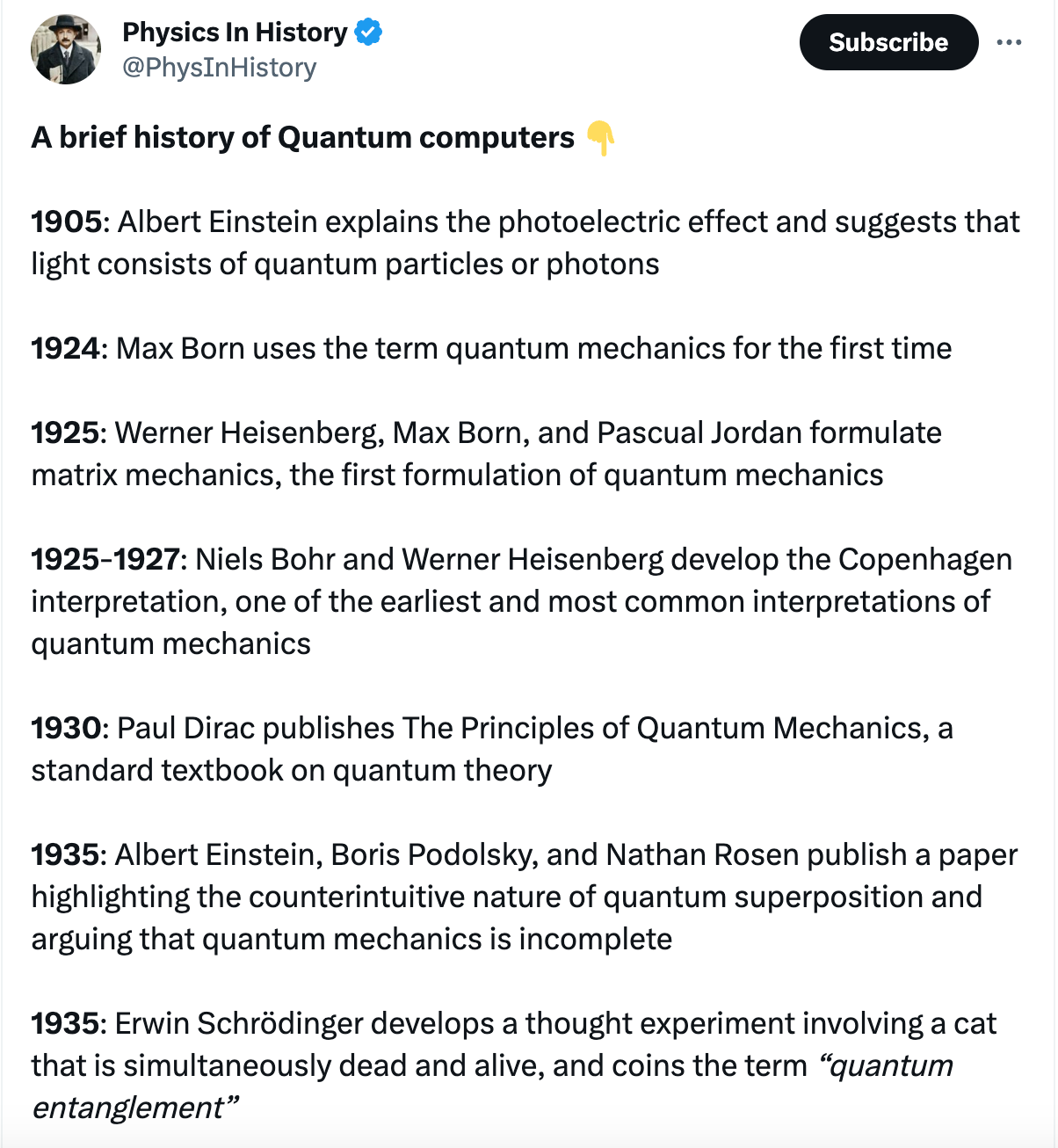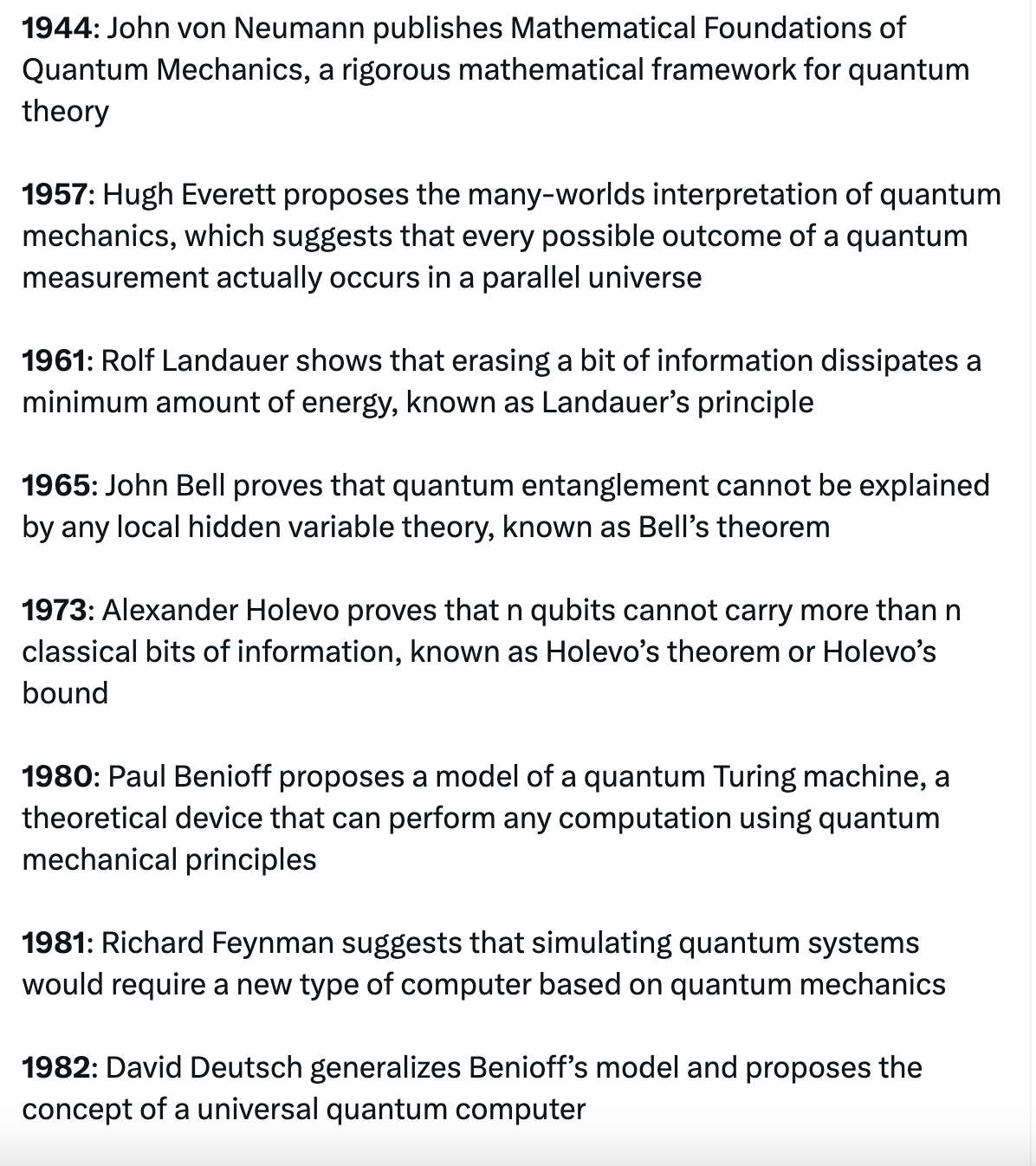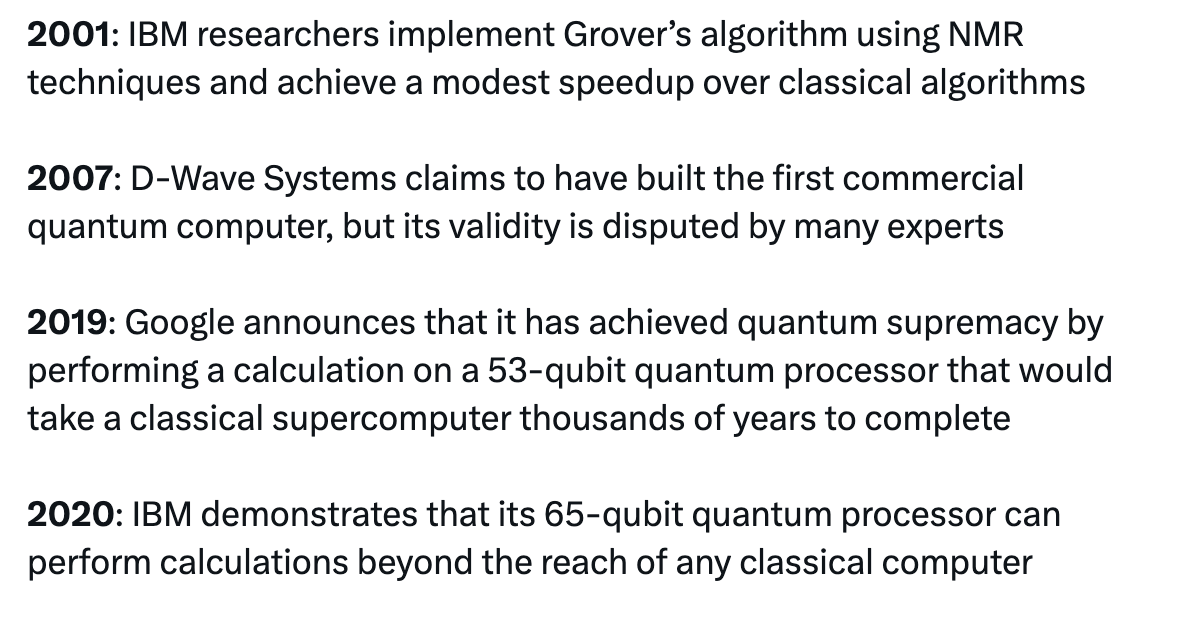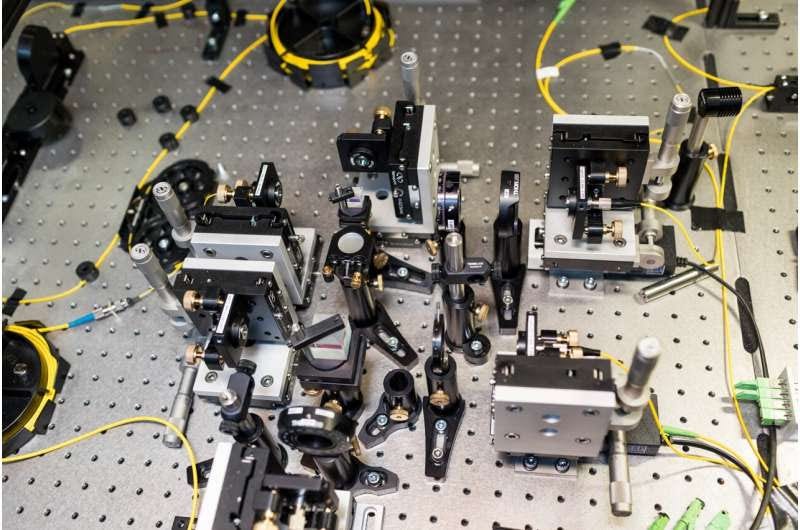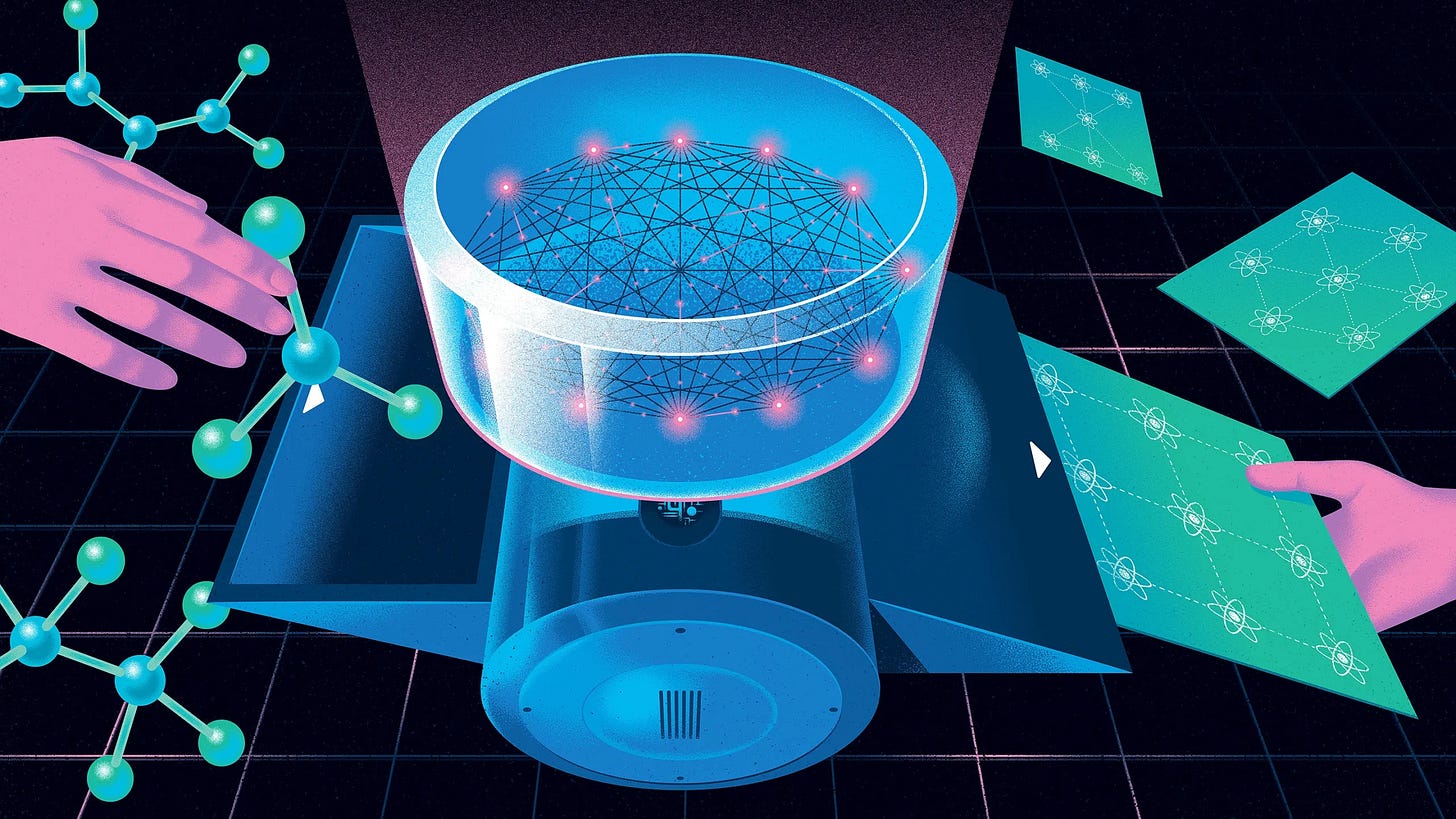The Week in Quantum Computing - September 18th
Issue #152
The Week in Quantum Computing. Brought to you by Sergio Gago (@piratecto).
Quick Recap
A team of researchers has introduced a high-performance decoder for quantum computers, potentially paving the way for practical fault-tolerant quantum computing. Quantinuum has developed a Quantum Monte Carlo Integration (QMCI) engine designed for evaluating multi-dimensional integrals in fields like finance and engineering. Researchers funded by the Simons Foundation have revealed an advanced algorithm for solving certain linear equations. A breakthrough in quantum communication has been accomplished by researchers at the University of Stuttgart and the Center for Integrated Quantum Science and Technology (IQST), who have exceeded the theoretical upper limit of quantum communication. D-Wave Quantum Inc. has made significant strides with its fluxonium qubits, a crucial component in annealing architectures. Infleqtion, has announced the open beta release of Superstaq.
In terms of cybersecurity, the advent of quantum computing raises challenges for current encryption systems. Based on this, the U.S. is aiming to shift to post-quantum cryptography (PQC) protocols by 2035. Also in the US National Science Foundation (NSF) has allocated $76 million to support four physics centers in conducting revolutionary research. NVidia and Pennylane dance together mixing CuQuantum and Pennylane. Nvidia also partnered with Jülich Supercomputing center and ParTec to build a new quantum - HPC lab.
A brief history of Quantum
Original tweet:
https://twitter.com/PhysInHistory/status/1702696371893993821?t=cIZ-ZNYghD_ZySsYdRKfTA&s=09
The Week in Quantum Computing
Is Quantum Computing the Key to a Greener AI Future?
Current AI systems consume massive amounts of energy, which poses environmental concerns.
Quantum computing offers a promising solution to significantly reduce AI's energy footprint.
Quantum-inspired computing can optimize neural networks and cut energy consumption.
Link: https://ift.tt/ZDn0jd5
September 11, 2023 at 04:31PM
Paper: A real-time, scalable, fast and highly resource efficient decoder for a quantum computer
Ben Barber and a team of 12 other researchers have developed a real-time, scalable, fast, and highly resource efficient decoder for quantum computers named the Collision Clustering decoder. The paper claims this decoder overcomes challenges of managing noise in quantum computers and efficiency at scale. The decoder has been implemented on FPGA and ASIC, with FPGA decoding frequency above a megahertz on an 881 qubit surface code and using only 4.5% of the available logical computation elements. The ASIC decoding frequency, on a 1057 qubit surface code, operates above a megahertz as well and consumes 8 mW of power. This decoder could potentially facilitate the realization of fault-tolerant quantum computers.
Link: https://ift.tt/0PueYwW
September 12, 2023 at 08:32AM
Paper: A Modular Engine for Quantum Monte Carlo Integration
A team of researchers including Ismail Yunus Akhalwaya and ten others have developed a Quantum Monte Carlo Integration (QMCI) engine. Funded by the Simons Foundation, the engine uses quantum computing for calculating multi-dimensional integrals frequently used in various scientific and engineering fields, particularly finance. The QMCI engine is developed by Quantinuum and its architecture includes distribution-loading methods, a unique quantum amplitude estimation technique, and a library of statistical quantities. Emphasizing modularity, the engine allows the creation of new quantum algorithms. It also includes a resource mode for precise resource measurement for the generated quantum circuits. The paper providing details about the engine's performance and application in finance was submitted on 11 August 2023.
Link: https://ift.tt/ZjTPBO6
September 12, 2023 at 09:32PM
Paper: Solving Systems of Linear Equations: HHL from a Tensor Networks Perspective
Alejandro Mata Ali, Iñigo Perez Delgado, Marina Ristol Roura, and Aitor Moreno Fdez. de Leceta, and Sebastián V. Romero, reportedly developed an algorithm to assist in solving systems of linear equations. The algorithm is based on the HHL methodology and introduces a new concept of qudits, a generalization of qubits with more states. The researchers aim to diminish the number of gates needed and reduce overall resource use via this quantum-inspired strategy. The team takes advantage of tensor networks' capability to perform non-unitary operations like projection and use the algorithm to resolve various complex equations, including the forced damped oscillator and the 2D static heat equation differential equations.
Link: https://ift.tt/3jnD5zB
September 13, 2023 at 07:32AM
A linear path to efficient quantum technologies
"Researchers from the University of Stuttgart, in collaboration with the Center for Integrated Quantum Science and Technology (IQST), have exceeded previously assumed upper theoretical limits in quantum computation and communication. The study, led by Prof. Stefanie Barz, explores quantum entanglement to achieve improved efficiencies. Through the use of additional photons with entangled photon pairs, doctoral researchers Matthias Bayerbach and Simone D'Aurelio achieved a 57.9% success rate in Bell-state measurements, significantly surpassing the traditionally assumed limit of 50%. This advance required the use of 48 single-photon detectors operating in near-perfect synchrony. This breakthrough has implications for areas such as long-distance quantum communication. The findings were published in the journal Science Advances
Link: https://ift.tt/26R7OH4
September 13, 2023 at 12:32PM
D-Wave Demonstrates State-of-the-Art Coherence Results with Fluxonium Qubits
D-Wave Quantum Inc., the world’s first commercial supplier of quantum computers, has made notable strides in the development of high coherence qubits. The company has recently manufactured and operated fluxonium qubits, exhibiting quantum properties that are on par with the best seen in scientific literature to date. The measured coherence properties of these fluxonium qubits show relaxation times exceeding 100 microseconds, equivalent to the current state-of-the-art for such qubits. With an effective temperature of 18 millikelvin, D-Wave's fluxonium exhibits one of the best results reported in superconducting qubits. The quantum computing pioneer believes that fluxonium is a viable candidate for D-Wave's gate model quantum computing architectures.
Link: https://ift.tt/gRTpPLG
September 13, 2023 at 10:32PM
Infleqtion Unveils Open Beta Release of Superstaq: Accelerating Quantum Computing Performance
Infleqtion, the quantum information solution provider, has launched an open beta release of Superstaq. This development is aimed at accelerating the performance of quantum computing. The news from September 12, 2023, reflects significant progress in the realm of quantum technology.",
Link: https://ift.tt/ZsyJakG
September 14, 2023 at 08:31AM
When a Quantum Computer Is Able to Break Our Encryption, It Won't Be a Secret
A breakthrough in Quantum Computing was reached on October 23, 2019, when Google announced its quantum computer solved a mathematical problem faster than any supercomputer. While this achievement is similar in importance to the Wright Brothers' first flight, pundits deem it impossible to maintain secrecy around such advancements in quantum computing, as demonstrated when the paper detailing Google's accomplishment was inadvertently posted by NASA. A significant concern in the field is around Shor's Algorithm, which could allow quantum computers to break nearly all current Internet encryption, with far-reaching consequences. Current quantum computers can't execute Shor's Algorithm efficiently and experts estimate that relevant quantum computers might only be developed by the 2030s. In response to this threat, the US National Institute of Standards and Technology (NIST) is developing post-quantum cryptography (PQC) protocols, and the US government has initiated transitioning processes to PQCs with a goal to mitigate quantum risk by 2035. Yet, experts argue that awareness about the existence of cryptanalytically relevant quantum computers (CRQCs) will define the severity of the threat they pose.
Link: https://ift.tt/sBreYWM
September 14, 2023 at 11:31AM
NSF Investing $76 Million In Four University-Based Physics Frontier Centers
The US National Science Foundation (NSF) is investing $76 million in four physics centers at various universities as part of groundbreaking research in physics. The funding ranges from $14 million to $25 million over a six-year period for the centers at the University of Chicago, the California Institute of Technology (CalTech), the University of Colorado and the Massachusetts Institute of Technology (MIT). Apart from research activities, these centers will also provide training for students and researchers, mentorship, and activities to encourage school students to consider a career in science. The University of Chicago's new NSF Physics Frontiers Center for Living Systems, led by Margaret Gardel, will focus on how living matter can store, retrieve and process information. CalTech's Institute for Quantum Information and Matter aims to create new quantum materials and develop algorithms for quantum computing and cryptography. The Comprehension and Control of Emerging Complexity at the Quantum Frontier based at the University of Colorado will explore quantum systems, develop light sources to control quantum properties, and work on ways to engineer the quantum states of complex molecules. Finally, the MIT's Center for UltraCold Atoms, a joint effort with Harvard University, will focus on gaining greater control and programmability of complex quantum systems.
Link: https://ift.tt/BAPeYH2
September 14, 2023 at 11:31AM
Gearing up for mobility’s future with quantum computing
Quantum computing (QC), predicted to have widespread commercial application within five to ten years, could significantly enhance the mobility sector. McKinsey analysts predict rapidly increasing demand for electric vehicles (EVs), with sales expected to grow sixfold from 2021 to 2030. Advancements in battery technology, autonomous vehicles, and a shift towards greener modes of transport factor into this prediction. Almost $280 billion has been invested in automotive hardware and software solutions since 2010. The influence of QC could enable more efficient exchanges of large datasets, enhancing real-time decision-making and overall vehicle performance. McKinsey anticipates the economic value of QC in the automotive sector could range from $29 billion to $63 billion by 2035. Essential uses of QC in this context could include optimization algorithms, simulations, and data-driven risk analysis. Scarlett Gao, Timo Möller, Niko Mohr, Alexia Pastré, and Felix Ziegler contributed to this research
Link: https://ift.tt/sqSdr29
September 14, 2023 at 05:31PM
A Quantum Boost: cuQuantum With PennyLane Lets Simulations Ride Supercomputers
NVIDIA's cuQuantum software development kit is being used in conjunction with Xanadu’s quantum programming framework PennyLane to run quantum computing simulations on a supercomputer for the first time. The system is being trialed by Shinjae Yoo, a computational scientist at the U.S. Department of Energy’s Brookhaven National Laboratory, on the Perlmutter supercomputer using 256 NVIDIA A100 Tensor Core GPUs to simulate around 36 qubits. The multi-node version of PennyLane simplifies the complex task of accelerating massive quantum system simulations, making it possible for less experienced researchers to run large simulations. Yoo's work aims to advance high-energy physics and machine learning, with other researchers using quantum simulations for applications in chemistry and materials science. Xanadu's framework is also assisting companies like Rolls-Royce and Volkswagen Group in creating quantum algorithms for jet engine design and more powerful batteries for electric vehicles respectively. At the National Energy Research Scientific Computing Center (NERSC), at least four other projects leveraging PennyLane are underway. This software expansion could lead to simulations of more than 40 qubits by the end of the year.
Link: https://ift.tt/mzLgciT
September 14, 2023 at 05:31PM
Machine Learning Aids Classical Modeling of Quantum Systems
A new method allows classical machines to effectively model and predict quantum system behavior, potentially serving as a key advancement in the field of quantum computing. University of California, San Diego physicist Yi-Zhuang You states that this development changes the way quantum computation and machine learning are combined. Scott Aaronson, a computer scientist, proposed in 2017 that a full classical representation isn't necessary to understand a quantum system. In 2020, physicists Hsin Yuan (Robert) Huang and Richard Kueng refined this method to predict numerous characteristics of a quantum system using very few measurements. A practical approach in 2020 involved developing a ""classical shadow"" which, much like an actual shadow, presents condensed but essential information about its quantum system. Machine learning goes further to enhance this model by predicting how the quantum system changes over time. Recent research by Laura Lewis at the Simons Institute for the Theory of Computing exemplifies this, demonstrating a way to negate the increased training data requirements, making the method practically feasible.
Link: https://ift.tt/f7XEDsQ
September 14, 2023 at 10:32PM
A scalable and user-friendly platform for physicists to carry out advanced quantum experiments, cheaply
Researchers from the Departments of Physics and Electronic Systems Engineering at the Indian Institute of Science (IISc) have developed a scalable and user-friendly platform named Scalable Quantum Control and Readout System (SQ-CARS) for advanced quantum experiments. Built using a Xilinx RFSoC FPGA board, SQ-CARS addresses challenges such as generation and capture of high-fidelity microwave signals, scalability, and a user-friendly interface associated with quantum computing. The platform has made quantum experimentation more accessible by reducing costs by more than 10 times and significantly reducing its size. It was tested with superconducting transmon qubits and benchmarked against traditional setups. The development is seen as a significant step towards scalable indigenous quantum processors. The research was published in IEEE Transactions on Instrumentation and Measurement.
Link: https://ift.tt/CcEHO5F
September 15, 2023 at 07:30AM
Classically-Inspired Quantum Algorithms Considered Harmful and the Need for Quantum-Native Algorithms
Technology consultant and writer, Jack Krupansky, published an article where he posits that quantum programming should not rely heavily on classical programming techniques as this results in ""classically-inspired quantum algorithms"". These classically-inspired quantum algorithms, Krupansky argues, fail to fully exploit quantum parallelism which provides exponential speedup. He suggests that the future of quantum programming lies in designing original, ""quantum-native algorithms"". The article specifically mentions two main forms of classically-inspired quantum algorithms currently in use, Variational methods and Monte Carlo Simulation, asserting that these methods, while productive in classical computing, are not designed to take full advantage of quantum computing's capabilities
Link: https://ift.tt/XNOUB4V
September 15, 2023 at 08:32AM
Building a quantum-ready ecosystem
The emergence of quantum technologies has led to groundbreaking advancements in computing, sensing, secure communications, and simulation of advanced materials with practical applications in every industry sector. The rapid advancement of the quantum technologies ecosystem has made it imperative to assess the maturity of these technologies and their imminent acceleration towards commercial viability. The current status of quantum technologies is presented and the need for a quantum-ready ecosystem is emphasised. Standard Quantum Technology Readiness Levels (QTRLs) are formulated and innovative models and tools are defined to evaluate the readiness of specific quantum technology. In addition to QTRLs, Quantum Commercial Readiness Levels (QCRLs) is introduced to provide a robust framework for evaluating the commercial viability and market readiness of quantum technologies. Furthermore, relevant indicators concerning key stakeholders, including government, industry, and academia are discussed and ethics and protocols implications are described, to deepen the understanding of the readiness for quantum technology and to support the development of a robust and effective quantum ecosystem.
Link: https://ift.tt/JLG1vD7
September 15, 2023 at 01:32PM
REPLY Brings Quantum Computing Into Practice
Italy-based technology company Reply is leading the application-driven benchmarking of quantum computing research project named ""Bench-QC"", funded by the Bavarian State Ministry of Economic Affairs, Regional Development and Energy. The project, involving industrial partners and Fraunhofer institutes, is aimed at examining the practical usability of quantum computing in industrial applications. They're investigating when quantum computers can outperform classical high-performance computers with a focus on quantum-inspired optimization. Reply has developed an efficient classical solver for QUBO problems and a reference implementation for hybrid neural networks. Besides Reply, BMW, and Fraunhofer institutes for Integrated Circuits IIS and Cognitive Systems IKS are part of this three-year project, located within the Munich Quantum Valley initiative of the Bavarian state government.
Link: https://ift.tt/nF5dl6S
September 15, 2023 at 05:31PM
Jülich Supercomputing Centre to Build New Quantum Computing Lab with NVIDIA and ParTec
Sept. 15, 2023 — NVIDIA, ParTec, and the Jülich Supercomputing Centre are establishing a new laboratory to explore hybrid quantum-classical computing based on the NVIDIA quantum computing platform. JSC will host the lab as part of the Jülich Unified Infrastructure for Quantum Computing (JUNIQ).
The goal is to run high-performance, low-latency quantum-classical computing workloads. Currently, JUNIQ uses the JUWELS booster system with 3,744 NVIDIA A100 Tensor Core accelerators for its simulations.
The NVIDIA quantum computing platform enables tight integration of quantum and classical computing through the open-source CUDA Quantum programming model and the NVIDIA cuQuantum software development kit for first-class simulations.
JSC plans to test the system incrementally and will use the NVIDIA CUDA Quantum programming model to program and integrate quantum processors into the modular Jülich Exascale supercomputing architecture.
Link: https://ift.tt/58QhJou
September 16, 2023 at 06:30PM


